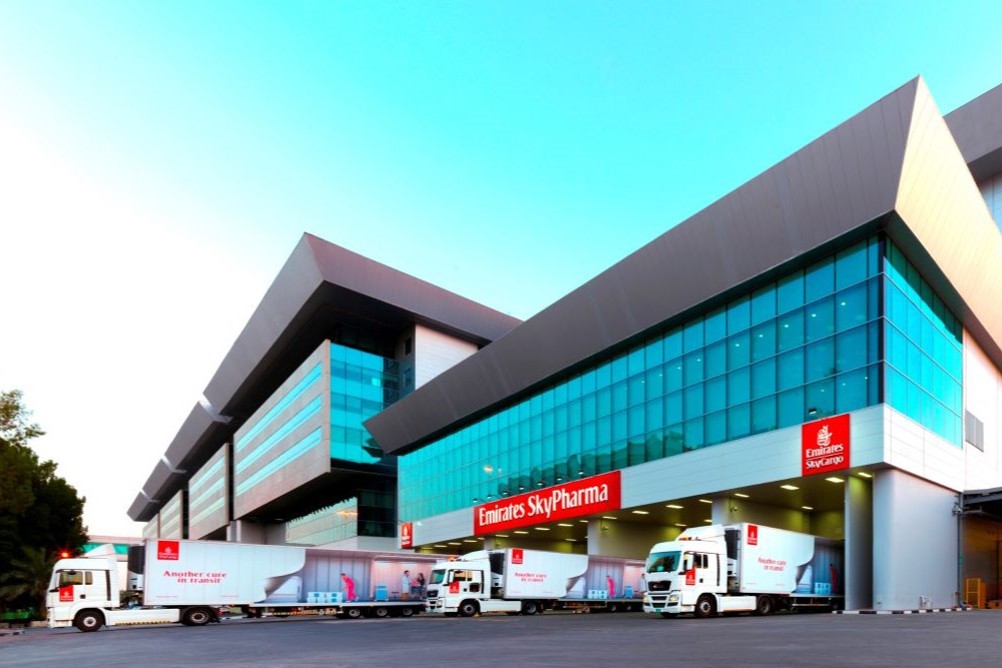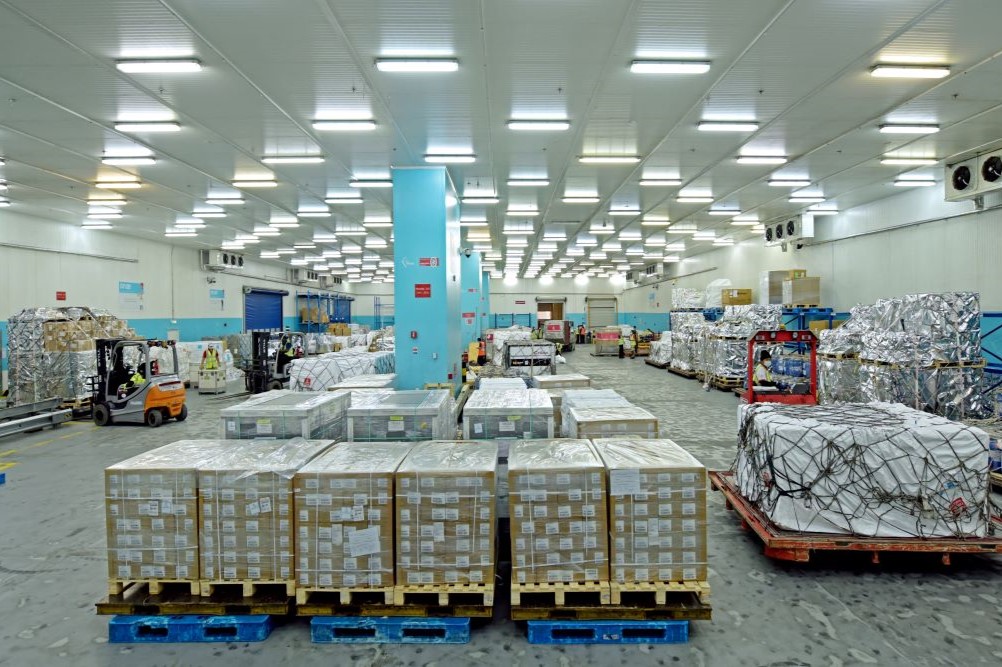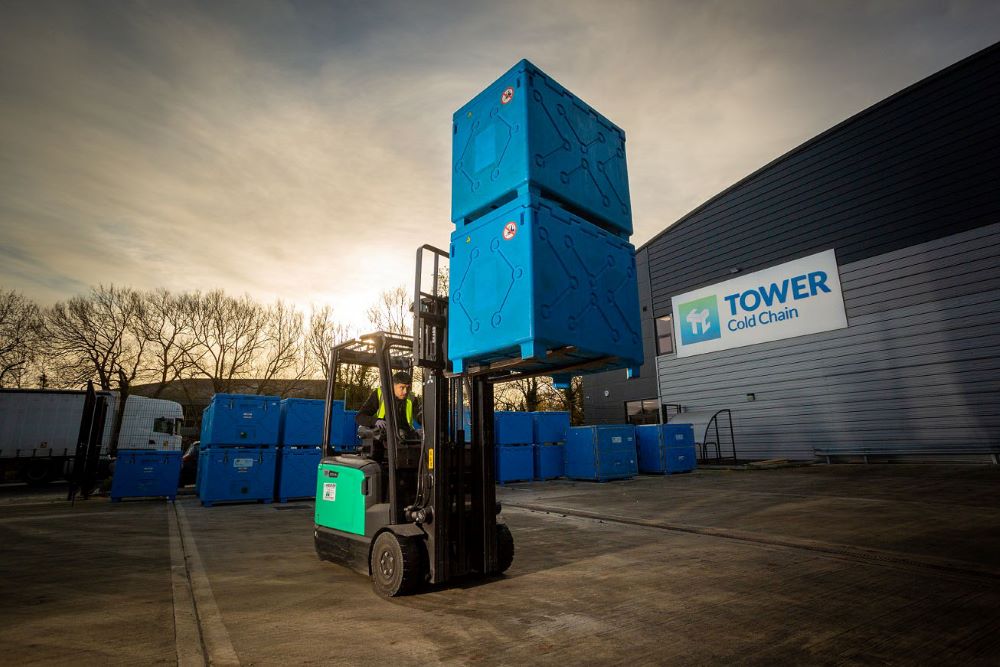
The air industry has always been vital for transporting pharmaceuticals, supporting vaccination programmes, saving people’s lives and helping them live healthy lives.
The pandemic shone a light on what air cargo offers as vaccines were able to move around the world in a fraction of the time compared to maritime freight.
Now the pandemic is over, the air cargo industry can use the lessons learnt to make further improvements.
At Saudia Cargo, pharma shipments have grown 50% annually since 2019 and volumes in the Middle East have increased 28% year-on-year with 2024 likely to register double-digit growth.
The core business remains transporting life-saving medicines with Saudia Cargo offering both passive and active containers designed to maintain a controlled temperature environment.
“These solutions, combined with our strong partnerships, guarantee the best possible protection for pharmaceutical products throughout their journey,” says a spokesperson from Saudia Cargo.
During the pandemic, Saudia Cargo transported different types of vaccines and was able to provide a variety of packaging options.
They say, “Delivering nearly 40 million doses of the Covid-19 vaccine has contributed to further streamlining our process for transporting life-saving medicines. Our commitment to safeguarding humanity is quite profound and last year we’ve managed to achieve a remarkable milestone, handling 16,000 tonnes of medicine, medical supplies, and vaccines worldwide.”
Around a year ago, Saudia Cargo started working on IATA CEIV Pharma certification, which it says was a natural decision due to evolving needs in the region and changing demand.
Customers have responded well to accreditation with Saudia Cargo saying, “We’ve made the firm commitment to facilitate the leasing of the best temperature-controlled packaging options and unrivalled knowledge, allowing us to provide our clients with the best possible services.”
Saudia Cargo has strategic partnerships with the best container providers including Swiss Airtainer, Sonoco Envirotainer, DoKaSch, CSafe, va-Q-tec, SkyCell and Tower Cold Chain to give customers a wide choice of services when shipping pharmaceuticals, biotech and life science products.
Saudia Cargo has also joined Pharma.Aero so it can share knowledge and best practices with other leading companies from across the industry.
The spokesperson continues, “These partners enable Saudia Cargo to continuously enhance its pharmaceutical transportation services, providing comprehensive solutions to meet the diverse needs of pharmaceutical clients worldwide.”
Saudia Cargo is always looking to the next technological advances to enhance its service offerings with Advanced Active Solution Technology being introduced last year, setting the benchmark for temperature stability and providing greater integrity for pharmaceutical products.
To make sure pharmaceuticals are handled securely and efficiently, Saudia Cargo has dedicated storage facilities, specialised equipment and harmonised handling procedures, and has dedicated trained staff to look after the shipments.
“We have dedicated pharmaceutical handling facilities across our Jeddah, Riyadh, and Dammam hub where our climate control team operating 24/7, ensure unwavering support for the safe transport of pharmaceuticals all backed by our expedited customs and Saudi FDA clearance, a GDP quality system, and trained staff, which guarantee a streamlined process that prioritises the integrity of healthcare shipments,” says the spokesperson.
With an evolving market, Saudia Cargo is always looking at further improvements for equipment and services.
In anticipation of market expansion, Saudia Cargo is on track to obtain three ISO certifications to help navigate global disruptions, manage risks and uphold global compliance standards.
Globally, Saudia Cargo expects the pharmaceutical market to grow and the growth will be strong in the Middle East, increasing demand for logistics services.
The spokesperson adds that Saudia Cargo projects the Middle East pharmaceutical market will grow 37% between 2025 and 2032 and the airline remains at the forefront of innovation.
"In a landscape where accuracy and dependability are of utmost importance, Saudia Cargo staunchly advocates for pharmaceutical logistics, guaranteeing the timely delivery of life-saving supplies to those in critical need.”
Resilient business
Emirates SkyCargo handles around two million kilos of pharmaceuticals through its Life Sciences and Healthcare product portfolio every week, with the sector remaining strong, says Julian Sutch, Global Head of Pharma Sales.
Under the Life Sciences and Healthcare umbrella, Emirates SkyCargo has developed specialist products tailored to the variety of products that use air cargo services.
Sutch says, “The biggest increase in cargo has come from individual patient treatments, which is a trend we’re seeing across the industry. Pharma has always been a highly successful and resilient business for us and we have reinforced our capabilities to ensure we hold our position as a market leader.”
Emirates SkyCargo will develop new products to help customers solve transportation challenges, which resulted in Emirates Vital and Emirates Medical Devices being launched last year. They are bespoke products developed in coordination with customers.
Emirates Vital serves the clinical trial, cell and gene therapy and human samples markets.
Sutch says the personalised medicine market is expected to be worth $3.18 trillion in 2025 and that personalised treatments are priceless and often irreplaceable so there is no room for error in transit.
He says, “We redesigned the entire process, offering sped up connection times of under four hours in Dubai and utilising the bulk hold of the aircraft to transport this highly sensitive cargo.”
The technology to diagnose, prevent, treat and monitor disease is becoming more technical and delicate so medical devices and equipment that would have been shipped as general cargo increasingly need specialist solutions.
This is why Emirates Medical Devices was launched as a standalone product handling products including ventilators and test kits, X-ray machines and MRIs.
Since 2015, Emirates SkyCargo has invested around $200 million in its pharma infrastructure.
Emirates SkyCargo operates the largest GDP-certified temperature-controlled pharma facilities between its two Dubai hubs, dedicating 15,000 square metres of storage to temperature-controlled goods.
Sutch says, “We have introduced innovative new technology, such as our fleet of cool dollies to mitigate the risk of temperature fluctuation and facilitate smoother transportation.”
As more specific and complex treatments are developed, the need for an effective and efficient logistics network will grow, says Sutch.
He adds, “We will see the most impactful change through closer collaboration amongst all stakeholders in the supply chain. By being more aware of the challenges in our industry, we are able to collectively address them, for the ultimate good of the end consumer.”

Safe transport solutions
The need to transport pharmaceuticals and medical supplies quickly and efficiently has caused the demand for temperature-controlled cargo solutions to surge, says Natalie Robinson, Global Head of Operations at Tower Cold Chain.
Its reusable passive containers come in various capacities and cater for different industry needs such as mass pharmaceutical shipments, clinical trials, life sciences and last mile delivery.
Robinson says the Evolution 1600 Universal Pallet is an example of product innovation specifically for the air cargo industry.
It can cater for US and EU pallets, has an internal payload of 1,639 litres and over 120 hours of temperature protection.
She says, “Before this solution, the industry faced the logistical challenge and expense of having to use separate containers for each global pallet.”
The pharma logistics industry was placed under pressure during the pandemic with an unprecedented increase in the demand for vaccines and other medical supplies.
Robinson says this highlighted the critical role of container providers who ensure the safe and timely delivery of temperature-sensitive products.
Challenges posed by the pandemic such as temperature requirements for Covid-19 vaccines and disruption to global supply chains accelerated the adoption of digital technologies and risk mitigation approaches, she says.
“While the full extent of the pandemic's impact on the industry remains to be seen, it has undoubtedly prompted a re-evaluation and enhancement of logistical capabilities, paving the way for long-term changes in pharma logistics practices,” comments Robinson.
The importance of agility and scalability as circumstances evolve was demonstrated, with Robinson saying that stakeholders need to make sure that their logistics operations are flexible to adapt to changing demand patterns, regulations and supply chain disruption.
The pandemic spurred innovation to make cold chain networks more efficient, reliable and resilient, says Robinson, explaining, “Moving forward, the industry must leverage the lessons learned from the pandemic to strengthen its response capabilities and foster greater resilience in the face of future challenges.”
Tower Cold Chain is committed to advancing pharma logistics through product development, digitalisation and sustainability with its solution incorporating cutting-edge technology to enhance visibility, transparency and traceability.
Data-driven insights can optimise logistics operations, improve efficiency and mitigate risks, says Robinson.
She continues, “In our commitment to sustainability, Tower continuously works to expand and develop our range of fully reusable containers with efficient technologies and innovative product design alongside carbon footprint reduction strategies to minimise environmental impact and promote sustainable practices across the industry.”
Collaboration is key for advancing the industry; Tower Cold Chain is a member of Pharma.Aero and the Cool Chain Association, helping it share best practices, industry insights and participate in initiatives to improve pharma logistics.
“We are committed to strengthening strategic partnerships by fostering industry collaboration and expanding our growing hub networks to enable the sustainable, seamless transportation of pharmaceutical products around the world,” adds Robinson.

Global connectivity
Amsterdam Airport Schiphol is one of the busiest airports in Europe, which gives pharmaceutical shippers the reliability and connectivity that they demand for their high-value products.
Before Joost van Doesburg took up the role of Head of Cargo early last year, he worked for unions and the European Shippers Council, whose members include a number of leading pharmaceutical companies.
Van Doesburg says the pharmaceutical shippers are very interesting companies to represent because they are most demanding shippers whose products have specific requirements.
Pharmaceutical shippers are more interested in reliability than cost, which, as an airport operator, is the direction Schiphol wants to go.
“We are not focused on cost, being the biggest air cargo hub of Europe or the cheapest but we want to be the most reliable and the highest quality air cargo hub of Europe,” says van Doesburg.
He continues that an airport can have the best handling facilities but that is useless if the access is poor so Schiphol wants seamless cargo flows from the shipper to the freight forwarder to the handler then on to the aircraft.
This is why Schiphol is investing in its airport community system so the right digital infrastructure is in place.
Schiphol’s slot booking system is reducing landside congestion around the five first-line handling facilities.
Pharmaceutical shippers want space on aircraft that leave as promised, like when passengers book a flight, which is why they prefer belly capacity in passenger aircraft because they are more reliable.
Schiphol is the most connected passenger airport in Europe, after London’s Heathrow Airport, due to the networks of KLM and other intercontinental airlines, getting goods as close to their final destination as possible.
Mid-2023, Erasmus University carried out research for Schiphol to find out what were the most important commodities for the future and their conclusions were pharma and the high-tech industries.
“That is why we will invest to facilitate these commodities, which will also give logistics service providers the possibility to make extra money because extra-care cargo gives them the opportunity to make a higher yield. That is why we are happy that GEODIS has opened a big, new facility at the airport, like many others,” he says.
Before IATA CEIV Pharma, the pharmaceutical shippers were the most involved shippers, and they still are, because they want to see facilities and an airline’s cargo products to assess the abilities of the service providers.
They were also involved in controlling time sensitivity of their products, explains van Doesburg, because a small pallet of goods can be worth millions of euros.
Having a certificate, even CEIV Pharma, is not enough for many pharmaceutical shippers, they want to do site visits to see if promises are being kept.
Pharmaceutical shippers, who placed data loggers in their shipments, were frustrated at working out who was responsible for ruining their produce and no one seemed to take their concerns seriously, explains van Doesburg.
CEIV filled in the gap to establish a higher level of product awareness but does not stop them taking an interest in how their products are handled.
“There is no certificate that will take away all of the concerns of shippers. That is a positive attitude, I would like more shippers to get involved with their supply chain because CEIV does not take away all the concerns,” says van Doesburg.
At the IATA World Cargo Symposium in 2016, Pharma Gateway Amsterdam was launched to create a community of logistics and pharmaceutical companies to improve the supply chain.
Companies in the Netherlands like working together, says van Doesburg, and their own success is the first priority then working together to make improvements for everyone.
He says Air Cargo Netherlands is aligned with Pharma Gateway Amsterdam in working together to improve the supply chain.
Working with groups such as Air Cargo Netherlands and the Dutch Shippers Council, van Doesburg says there are no boundaries, saying, “There is no fence between us, they know how to approach us and are not afraid to say what is wrong or what should be improved. Fifty per cent of American and Asian distribution centres for Europe are located in the Netherlands so we are representing a lot of pharma goods. You need this dialogue to be aware of the latest developments.”
Pharma island
Life sciences are vital to Puerto Rico’s economy, consisting of 48% of GDP and exports are worth $50 billion a year.
The industry supports almost 80,000 direct jobs and 300,000 indirect jobs on an island measuring 100 by 75 miles, which is home to 11 of the top 20 pharmaceutical manufacturers, meaning Puerto Rico has the highest density of pharma companies in the world.
Sixty to seventy per cent of exports head to the USA and Puerto Rico is the largest life science product exporter of any US state, Ivan Lugo, Executive Director of INDUNIV is proud to say.
The expertise in pharmaceuticals means Puerto Rico is the only jurisdiction of the USA to have highly specialised employment in four of the five bioscience areas.
Puerto Rico established itself as a pharmaceutical manufacturing hub due to tax incentives several decades ago to establish operations on the island, which resulted in producing high-quality talent and expertise, which is what pharma companies want.
A combination of adapting to industry needs, university involvement to meet industry requirements and a supportive government which invested in industrial property meant Puerto Rico quickly became an attractive location.
Humberto Mercader, Deputy Secretary, Department of Economic Development and Commerce, says, “It offered the industry competitive prices for ready-to-use buildings and we still have that inventory today and when you look at the main companies on the island, a big percentage are still in properties owned by the government.”
A year ago the Puerto Rico Life Sciences Air Cargo Community was established with Mercader saying it has improved cohesiveness and engagement, resulting in greater collaboration and communication.
Creating the community has raised Puerto Rico’s profile and resulted in airlines adding routes.
Lugo says, “You have to have alignment of strategy and vision. This administration has been very supportive of the industrial sector and that is what you need for all the pieces to come together. The leadership needs to be in the private sector but the catalyst was the government.”
Puerto Rico has a strong pharma supply chain, continues Lugo, who says individual companies need to harmonise quality so everyone speaks the same language.
CEIV Pharma has been promoted among the community so people from university students upwards know what it is and understand its benefits.
Puerto Rico’s government has been providing financial support and Lugo expects a domino effect of companies wanting to get certified.
Following quality and standards, the next phase is data and making it available for the community.
Through a partnership with Rotate, data covering market demand and supply, routes and other information was studied to create a dashboard to assist community members with their planning and operations.
Infrastructure is getting upgraded such as improved road access at Luis Munoz Marin International Airport in San Juan and Rafael Hernandez Airport in Aguadilla will receive $300 million of upgrades in the next five years.
Puerto Rico has the location and a DoT waiver allowing cargo transhipments, now it is spreading the word as not everyone realises the size of its industry.
Mercader says, “We are trying to promote and market Puerto Rico because all of us benefit. We are attending conferences we have never been to before, we started doing PR outside Puerto Rico and doing outreach for companies who don’t have an idea about the potential that Puerto Rico represents.”
This article was published in the June/July 2024 issue of Air Logistics International, click here to read the digital edition and click here to subscribe.
